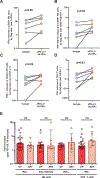Immune Checkpoint Blockade Restores HIV-Specific CD4 T Cell Help for NK Cells
- PMID: 29934472
- PMCID: PMC6064609
- DOI: 10.4049/jimmunol.1701551
Immune Checkpoint Blockade Restores HIV-Specific CD4 T Cell Help for NK Cells
Abstract
Immune exhaustion is an important feature of chronic infections, such as HIV, and a barrier to effective immunity against cancer. This dysfunction is in part controlled by inhibitory immune checkpoints. Blockade of the PD-1 or IL-10 pathways can reinvigorate HIV-specific CD4 T cell function in vitro, as measured by cytokine secretion and proliferative responses upon Ag stimulation. However, whether this restoration of HIV-specific CD4 T cells can improve help to other cell subsets impaired in HIV infection remains to be determined. In this study, we examine a cohort of chronically infected subjects prior to initiation of antiretroviral therapy (ART) and individuals with suppressed viral load on ART. We show that IFN-γ induction in NK cells upon PBMC stimulation by HIV Ag varies inversely with viremia and depends on HIV-specific CD4 T cell help. We demonstrate in both untreated and ART-suppressed individuals that dual PD-1 and IL-10 blockade enhances cytokine secretion of NK cells via restored HIV-specific CD4 T cell function, that soluble factors contribute to these immunotherapeutic effects, and that they depend on IL-2 and IL-12 signaling. Importantly, we show that inhibition of the PD-1 and IL-10 pathways also increases NK degranulation and killing of target cells. This study demonstrates a previously underappreciated relationship between CD4 T cell impairment and NK cell exhaustion in HIV infection, provides a proof of principle that reversal of adaptive immunity exhaustion can improve the innate immune response, and suggests that immune checkpoint modulation that improves CD4/NK cell cooperation can be used as adjuvant therapy in HIV infection.
Copyright © 2018 by The American Association of Immunologists, Inc.
Conflict of interest statement
Figures





References
-
- Day CL, Kaufmann DE, Kiepiela P, Brown JA, Moodley ES, Reddy S, Mackey EW, Miller JD, Leslie AJ, DePierres C, Mncube Z, Duraiswamy J, Zhu B, Eichbaum Q, Altfeld M, Wherry EJ, Coovadia HM, Goulder PJ, Klenerman P, Ahmed R, Freeman GJ, and Walker BD. 2006. PD-1 expression on HIV-specific T cells is associated with T-cell exhaustion and disease progression. Nature 443: 350–354. - PubMed
-
- Trautmann L, Janbazian L, Chomont N, Said EA, Wang G, Gimmig S, Bessette B, Boulassel MR, Delwart E, Sepulveda H, Balderas RS, Routy JP, Haddad EK, and Sekaly RP. 2006. Upregulation of PD-1 expression on HIV-specific CD8 + T cells leads to reversible immune dysfunction. Nat Med. - PubMed
Publication types
MeSH terms
Substances
Grants and funding
LinkOut - more resources
Full Text Sources
Other Literature Sources
Medical
Research Materials

